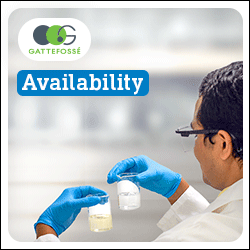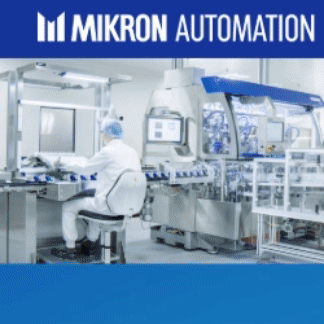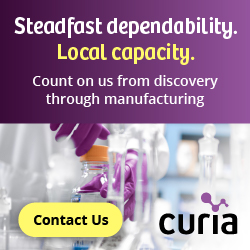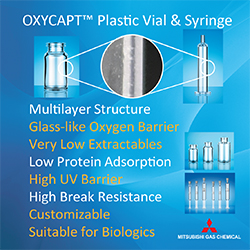12/27/2012
Radius & 3M Announce Exclusive Agreement
Radius Health, Inc. and 3M Drug Delivery Systems recently announced an exclusive partnership agreement for development and commercialization of BA058-transdermal (TD). BA058 is a novel, synthetic proprietary peptide analog of human parathyroid hormone related protein or hPTHrP, a bone building anabolic compound with the potential to treat patients with osteoporosis at high risk of fracture. This agreement updates the general development agreement announced in May 2011 by the two companies for BA058-TD.
BA058-transdermal (TD) is being studied in a Phase II clinical trial in healthy postmenopausal women with osteoporosis at 10 clinical centers. BA058-TD is a short-wear time patch based on 3M’s patented Microstructured Transdermal System technology. The transdermal patch is expected to combine ease of use, convenience, and self-administration attributes of a patch with the bone building efficacy of the BA058 compound.
“We are excited that 3M Drug Delivery Systems, which has long demonstrated a commitment to quality, safety, and innovation, is partnering with us to bring a novel approach of drug delivery to the underserved osteoporosis patient population,” said Michael Wyzga, Radius President and Chief Executive Officer. “Our study data for BA058-TD showed that a 5-minute wear time of the patch delivers peak drug levels consistent with subcutaneous injection and we hope to see increased patient compliance with 3M’s innovative technology.”
3M Drug Delivery Systems has partnered with pharmaceutical companies worldwide for more than 50 years, providing customized solutions to drug delivery.
“We are pleased to be part of Radius’ mission of advancing therapeutics for healthy aging with its deep expertise in osteoporosis,” added Ingrid Blair, MTS/TDD Business Vice President of 3M Drug Delivery Systems. “With this exclusive agreement, 3M and Radius demonstrate our commitment to this innovative therapeutic treatment and this unique drug delivery mechanism. We believe this new drug potentially will improve the health of patients with severe osteoporosis and that 3M’s microneedle patch technology may improve medication compliance among patients.”
BA058 is also being studied as a daily subcutaneous injection (BA058-SC) in a Phase III study with 2,400 patients for fracture prevention in women with postmenopausal osteoporosis at high risk of fracture. Phase II human testing of the injectable BA058-SC showed that BA058 significantly increased bone mineral density (BMD) at the lumbar spine and femoral neck (a common osteoporotic fracture site located in the hip joint) after six months of therapy.
Radius is a biopharmaceutical company focused on developing and commercializing advanced therapeutics to support healthy aging. For more information, visit www.radiuspharm.com. 3M Drug Delivery Systems partners with pharmaceutical and biotech companies to develop pharmaceuticals using 3M’s inhalation or transdermal drug delivery technology, including microneedles. 3M offers a full range of feasibility, development, and manufacturing capabilities combined with regulatory guidance to help bring products to market. For more information, visit www.3M.com/dds.
Blend Therapeutics Secures $16 Million
Blend Therapeutics, Inc. recently announced it has secured a $16-million Series B financing. Blend is pioneering an integrative model for discovering novel molecular entities with new mechanisms of action purposely designed for Blend’s proprietary nanoparticles. By synergistically developing both the molecule and the nanoparticle together, Blend can make medicines more targeted, more effective, and more tolerable.
NanoDimension led the Series B round with participation from other existing investors, Flagship Ventures, and New Enterprise Associates. Proceeds from the financing will be used to expand Blend’s product and business development teams and to advance the company’s lead programs through studies to enable filing of an investigational new drug (IND) application with the US FDA.
The funding will enable Blend to pursue its initial focus in oncology as the company continues research and development of new classes of platinum drugs. The company will expand the development of its proprietary molecules for oncology, which include a portfolio of mono-functional platinums that have an entirely different mode of DNA platination and unprecedented biological differentiation compared to that of existing platinum drugs. Blend’s platinum drug discovery program is fueled by chemical insights provided by structural and innovative mechanistic studies of Dr. Stephen J. Lippard, who is a founder of Blend and the Arthur Amos Noyes Professor of Chemistry at the Massachusetts Institute of Technology.
“Blend has made great progress translating its novel, integrated, new molecule discovery engine and nanoparticle engineering platform into exciting first-in-class product candidates in oncology,” said Ed Kania, Managing Partner and Chairman of Flagship Ventures. “We share the patient-focused and product-driven vision of the team at Blend, and we are excited to be joining with NanoDimension and NEA to support the Blend team with our collective resources and strategic reach as they advance their anti-cancer drug candidates.”
“This Series B investment clearly recognizes the value that the Blend team created since the last financing a year ago and will enable the company to pursue untapped opportunities with broad potential impact in oncology as we develop cancer therapies with superior selectivity and efficacy,” added Mark Iwicki, President and Chief Executive Officer of Blend Therapeutics. “With several product candidates in multi-billion dollar categories in our pipeline, this financing will allow us to advance two lead molecules through IND-enabling studies, each of which involves a novel platinum molecule with new modes of action for cancer therapy.”
Blend Therapeutics is a biopharmaceutical company discovering new classes of medicines that have unique modes of action to result in drugs with differentiated therapeutic properties. For more information, visit www.blendtx.com.
Pisgah Laboratories Receives Patent for Abuse-Deterrent Technology
Pisgah Laboratories, Inc. recently announced it has received US Patent No. 8,334,322 from the United States Patent and Trademark Office for innovative, abuse-deterrent forms of pseudoephedrine and ephedrine. The issued patent was for the application entitled Salts of Physiologically Active and Psychoactive Alkaloids and Amines Simultaneously Exhibiting Bioavailability and Abuse Resistance whose underlying application covers a breadth of related active pharmaceutical ingredients (APIs) that are often subject to drug abuse.
But what does pseudoephedrine have to do with drug abuse? Pseudoephedrine, found in popular decongestants and allergy medicines, is a very safe and effective drug and once was readily available to the consumer market without prescription. Unfortunately, pseudoephedrine is the preferred precursor for the illicit preparation of crystal meth (methamphetamine). Of course, the headlines are filled with society’s ills emanating from the scourge of methamphetamine abuse. Not surprisingly, the government’s response principally consisted of bureaucratic impediments to the legitimate availability and use of this compound in products such as Sudafed.
Without question, methamphetamine drug abuse creates hell on earth, but while Mexican drug cartels bring thousands of pounds of purified methamphetamine across our southern border, the small-time meth cooks prepare the illicit material from pseudoephedrine products which otherwise serve a genuine need in society. As laws were implemented, the law-abiding citizenry was subjected to additional scrutiny and even deprived of needed medications. Ultimately, pseudoephedrine products that were normally available over-the-counter (OTC) were placed behind the counter, further impeding access to reasonable treatment for sinus, cough, cold, and allergy symptoms.
Pisgah’s innovation cannot bolster the political will of spineless politicians to secure our southern border from the large-scale terrorism inflicted by Mexican drug cartels through illicit drugs. However, Pisgah’s pseudoephedrine addresses the drug’s potential for abuse at the drug substance level prior to formulation into a dosage form. Using chemistry, Pisgah has modified the active ingredient, pseudoephedrine, to remove the properties which enable ease of abuse. The illicit meth labs must first isolate the pseudoephedrine from the dosage form before its conversion to methamphetamine. This extraction process is quite easy in most cases, but Pisgah identified how to chemically modify the active so as to retain its medical properties while eliminating the likelihood of extraction and conversion.
One may begin to see why this complex discussion was provided for a rather common, over-the-counter product – which, today, isn’t as common or available for legitimate use. Now, with Pisgah’s innovation, product development efforts may be directed toward a valuable and needed drug product containing pseudoephedrine which isn’t susceptible to abuse – and particularly abuse by its conversion to methamphetamine. Similarly, and at the time of this release, Pisgah Laboratories is developing an abuse-deterrent hydrocodone product using a comparable methodology. Here too, the active ingredient, hydrocodone, is first chemically modified to impart the abuse-deterrent properties prior to its incorporation into a dosage form.
As Pisgah continues its development and business path, tangible accomplishments such as patent allowances and FDA product filings are becoming routine occurrences. With these successes, the company believes collaborative efforts and licensing from its patent portfolio to product-hungry branding partners will accelerate the development of drug products particularly in the treatment areas of pain management, attention deficit hyperactivity disorder, and obesity. For more information, visit www.pisgahlabs.com.
Atlantic Pharmaceuticals Makes Major Announcement
Atlantic Pharmaceuticals, Inc. recently announced that new patents have been issued by the USPTO relating to its tamper-resistant SMART/Script drug delivery platform. US Patent Nos. 8,187,636 and 8,349,362 contain claims that cover Atlantic’s proprietary tamper-resistant platform, which are designed to resist dose dumping of orally delivered opioids and may sequester and reduce drug release of a drug that has been subjected to a variety of physical methods of tampering. The technology can be applied to immediate as well as sustained release drug candidates.
“We believe SMART/Script is a unique technology that may have a significant effect on prescription drug abuse and misuse,” said Anthony Soscia, President of Atlantic Pharmaceuticals. “These patents further add to our intellectual property portfolio and provide us with extensive coverage until 2028 for our novel, tamper-resistant technology.”
SMART/Script (SMART, Simple, controllable, resistant, insoluble, physical trap), a novel, patented drug delivery platform, was designed to prevent easy drug extraction and to deter the abuse of medications via known routes of abuse, including chewing, snorting, and injecting. Orally delivered tamper-prone pharmaceuticals are frequently subjected to abuse and misuse via chewing and swallowing or crushing and either snorting or injecting the resultant powdered drug. A product formulated with SMART/Script however, resists dose dumping in water or alcohol and can be used with a broad range of opioids and non-opioids in immediate or extended release forms. SMART/Script is also unique among competitive technologies in that physical tampering of the dosage form may reduce the release rate of the drug from the dosage when subject to certain forms of physical tampering as opposed to increasing it.
Atlantic Pharmaceuticals is a specialty pharmaceutical company using its patented technology to produce novel therapeutics that resist attempts at tampering and may be useful to reduce abuse of certain prescription drugs. Based on the company’s proprietary technology, SMART/Script, Atlantic is developing a pipeline of tamper-resistant opioids that are nearing pivotal testing.
The company’s lead SMART/Script candidate, ATLP-02, is an immediate release formulation of oxycodone that is in development and will be covered by the issued patents. In addition, these patents will also cover other product candidates being formulated using the SMART/Script technology. The company finalized a Pre-Investigational New Drug Meeting with the FDA in March 2011 for ATLP-02. SMART/Script has also been recognized as a leading technology that may potentially decrease tampering with medication by the Center for Lawful Access and Abuse Deterrence. Please visit atlanticpharma.com for more information or contact Anthony Soscia, President, at info@atlanticpharma.com or (404) 994-5135.
Raptor Signs $50-Million Agreement With HealthCare Royalty Partners
Raptor Pharmaceutical Corp. recently announced it has signed a $50-million loan agreement with HealthCare Royalty Partners to help fund the commercialization of PROCYSBI, the branded name of RP103 for the potential treatment of nephropathic cystinosis, and advance the company’s development programs.
Under the terms of the agreement, Raptor will receive $25 million at closing and an additional $25 million upon US FDA approval of PROCYSBI. The First Tranche and Second Tranche Loans, which mature on December 31, 2019, bear interest at an annual fixed rate of 10.75% and a Synthetic Royalty variable rate, tiered down, based on a percentage of future PROCYSBI sales. The loan is interest-only for the first 2 years.
“This loan agreement with HC Royalty further validates the growing value of PROCYSBI and Raptor’s pipeline. We believe that the proceeds of this financing will provide us with the necessary capital to fund our activities through FDA approval of PROCYSBI, based on our current assumptions for the timing of a potential FDA approval of PROCYSBI, as well as to fund our plans to launch PROCYSBI in the US, if approved by the FDA,” said Christopher Starr, Raptor’s CEO. “At closing of the first Tranche, we will have over $55 million in cash on our balance sheet, with an additional $25 million to be funded under the Second Tranche Loan upon FDA approval of PROCYSBI.”
“There is significant unmet market need for a more tolerable cystinosis treatment with a less burdensome dosing schedule, and we believe PROCYSBI will fill that need for patients once it is approved by the FDA,” added Clarke B. Futch, Founding Managing Director at HC Royalty. “We are pleased to partner with Raptor to help fund the commercialization of this important orphan drug.”
Cystinosis is a rare, life-threatening metabolic disorder that causes systemic toxic cystine accumulation. Toxic cystine accumulation leads to progressive and irreversible tissue damage and multi-organ failure including renal failure, blindness, CNS damage, respiratory deficiencies, muscle wasting, and premature death. Cystinosis is usually diagnosed in the first years of life and requires lifelong therapy. Left untreated, the disease is fatal by the end of the first decade of life. Daily cystine depletion is the primary treatment strategy for cystinosis. Despite a life-long requirement for cystine-depleting agent use to help preserve multi-organ function, a cumulative inability to maintain adequate cystine control results in the rapid deterioration of kidney function and ensuing need for kidney transplantation.
RP103 is an oral, delayed, and extended-release medication containing enteric-coated spheronized micro-beads of cysteamine bitartrate. PROCYSBI is the branded name of RP103 for the potential treatment of cystinosis. The New Drug Application and Marketing Authorization Application for RP103 for the potential treatment of nephropathic cystinosis have been submitted to the FDA and the European Medicines Agency, respectively, and the NDA has been assigned a PDUFA date of January 30, 2013.
RP103 is also in clinical development for the potential treatment of Huntington’s disease and non-alcoholic steatohepatitis (NASH). In cystinosis patients, RP103 may reduce cellular toxicity by continuously removing cystine from the lysosome. RP103, which can also cross the blood-brain barrier, was engineered specifically to allow release of cysteamine bitartrate micro-spheres in the duodenum for optimal absorption while simultaneously enabling administration every 12-hours for the potential treatment of cystinosis.
Raptor Pharmaceutical Corp. seeks to research, develop, and provide access to medicines that improve life for patients with severe and rare disorders. Raptor currently has product candidates in clinical development designed to potentially treat nephropathic cystinosis, Non-alcoholic Steatohepatitis, Huntington’s Disease, and aldehyde dehydrogenase deficiency. For more information, visit www.raptorpharma.com.
Aptuit & Alios BioPharma to Collaborate
Stuart Needleman, President and Chief Operating Officer, Aptuit LLC, recently announced that Aptuit and Alios BioPharma, South San Francisco, California, are collaborating in lead optimization projects for two of Alios’ anti-viral targets.
Mr. Needleman stated that Aptuit has put in place a multidisciplinary, cross-functional team of scientific professionals representing computational chemistry, medicinal chemistry, analytical chemistry, and Drug Metabolism and Pharmacokinetics (DMPK) capabilities. He said, “Under the leadership of Aptuit scientists, the team is working with Alios scientists in an environment of openness and honest communications as we advance the discovery process of their novel chemical series.”
Although the terms of the agreement were not disclosed, Mr. Needleman explained, “We appreciate the confidence and trust that Alios has placed in our experienced hands. The collaboration represents another good example of how Aptuit’s drug discovery capabilities can be applied to all therapeutic areas, including anti-viral, central nervous system, oncology, antibacterial, respiratory, and more.”
Leonid Beigelman, Chief Scientific Officer at Alios, added, “We are very pleased to be working with Aptuit’s multidisciplinary drug discovery team. They have an exceptional track record of success in delivering IND candidates with highly druglike properties optimized for favorable pharmacokinetic properties in humans.”
Aptuit LLC provides the most complete set of integrated early to mid-phase development services in the pharmaceutical industry. Drug Design & Discovery, Preclinical Biosciences, API Development and Manufacture, Solid State Chemistry, Drug Product Formulation Development & Manufacture, Sterile Fill Finish, Clinical Sciences, Consulting, and Aptuit INDiGO (a program that accelerates drug development) are offered as stand alone or integrated services. For more information, visit www.aptuit.com.
Total Page Views: 1364













